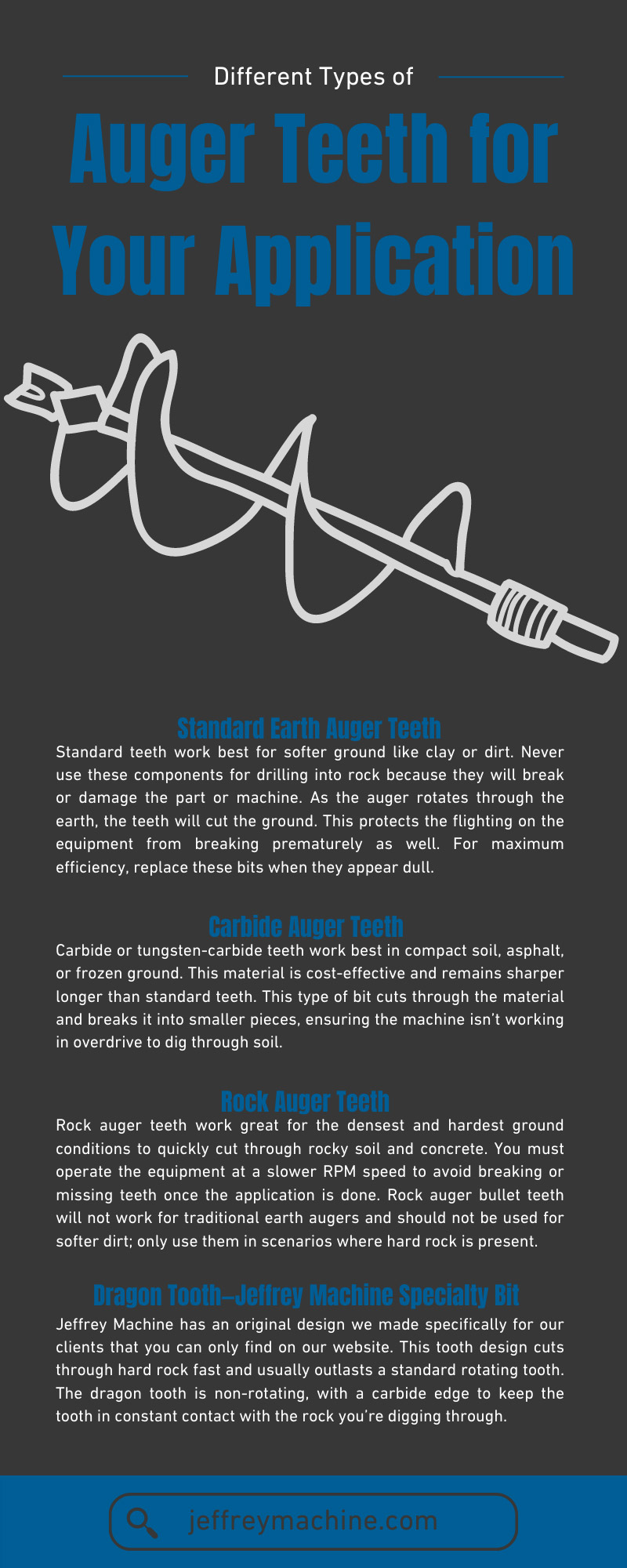Different Types of Auger Teeth for Your Application

When you’re building a foundation for a home or drilling into the ground with an auger, there are different types of teeth you should use depending on the ground condition and your application. The reason you use these bits on your equipment is so that you keep constant contact with the soil or rock while digging. Choosing the wrong tooth for the job could result in damage to the equipment; learn about these components and how to find the right one for your construction work.
Auger Teeth Structure
To begin, you must understand the different components of the teeth for your auger. Through this, you can determine which one is best for your application. Each bit will share varying features that work best in specific conditions. If you are not familiar with the structure of the teeth, you could choose an unsuitable part for your equipment.
Drill Diameter
The diameter of the bit is precisely what it sounds like. The diameter of the drill will determine the size of the hole. If your hole needs to be wider, then you need to choose a drill with a larger diameter.
Point Angle
This feature is the point or angle formed at the tip of the tooth. The type of material you’re working with will dictate the point angle on your bit. Soft soil or materials require sharper points on the tip, and harder materials or rock may require larger point angles. The type of point angle you use will prompt different rates of hole shape, chatter, and wear with the level of hardness of your material.
How Should You Decide on a Type of Tooth?
Now that you understand the structure of auger teeth, you can begin learning how to decide which tooth is best for your type of application. With multiple different types of bits, you must ensure you’re choosing the right kind, or you might not be performing your job duties correctly, which could potentially slow down or halt work due to using the incorrect equipment.
Dimensions of the Teeth
Manufacturers design teeth for certain augers. You may have an auger you could use for softer applications, but you need a different auger for drilling into asphalt or concrete. The shank on the bit must be compatible with your equipment to withstand the pressure from the auger as it drives into the ground. You should never use a tooth or bit with improper dimensions for your machinery. When you’re replacing these parts, find another that uses the same diameter tooth as the original.
Tooth Material
The tooth’s material can also help make a job application easier. For example, carbide teeth are very strong and work great for longer periods of time because they stay sharp longer than other metals. When choosing a material, you want to look for a premium brand which will hold up and perform better. What matters is how this part is used in construction and the quality grade of the metal.
Types of Teeth
For the types of teeth available, you can choose between rock, standard, and carbide tips. Use the knowledge from above to help you in your selection of auger teeth. Understand how each type of bit can help in different construction zone scenarios.
Standard Earth Auger Teeth
Standard teeth work best for softer ground like clay or dirt. Never use these components for drilling into rock because they will break or damage the part or machine. As the auger rotates through the earth, the teeth will cut the ground. This protects the flighting on the equipment from breaking prematurely as well. For maximum efficiency, replace these bits when they appear dull.
Carbide Auger Teeth
Carbide or tungsten-carbide teeth work best in compact soil, asphalt, or frozen ground. This material is cost-effective and remains sharper longer than standard teeth. This type of bit cuts through the material and breaks it into smaller pieces, ensuring the machine isn’t working in overdrive to dig through soil.
Rock Auger Teeth
Rock auger teeth work great for the densest and hardest ground conditions to quickly cut through rocky soil and concrete. You must operate the equipment at a slower RPM speed to avoid breaking or missing teeth once the application is done. Rock auger bullet teeth will not work for traditional earth augers and should not be used for softer dirt; only use them in scenarios where hard rock is present.
Dragon Tooth—Jeffrey Machine Specialty Bit
Jeffrey Machine has an original design we made specifically for our clients that you can only find on our website. This tooth design cuts through hard rock fast and usually outlasts a standard rotating tooth. The dragon tooth is non-rotating, with a carbide edge to keep the tooth in constant contact with the rock you’re digging through.
Remember how to choose a tooth for your auger to ensure the equipment will be at peak performance during the application. Never use an inappropriate bit on the machine, or you could damage or ruin your equipment along with slowing down production. If you have any questions regarding these parts for your auger, do not hesitate to contact us at Jeffrey Machine.

